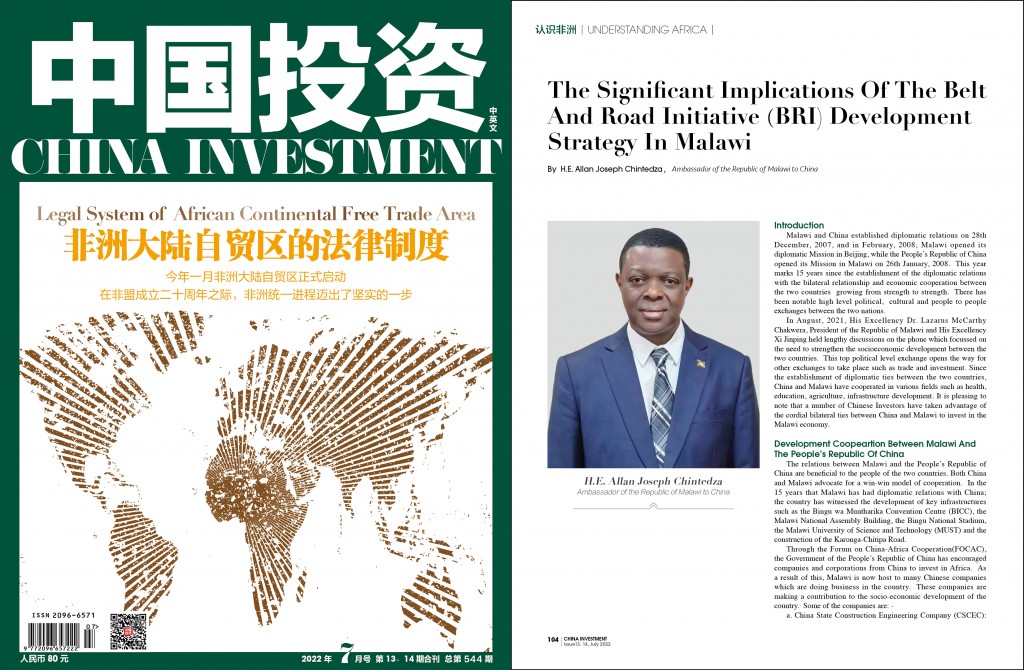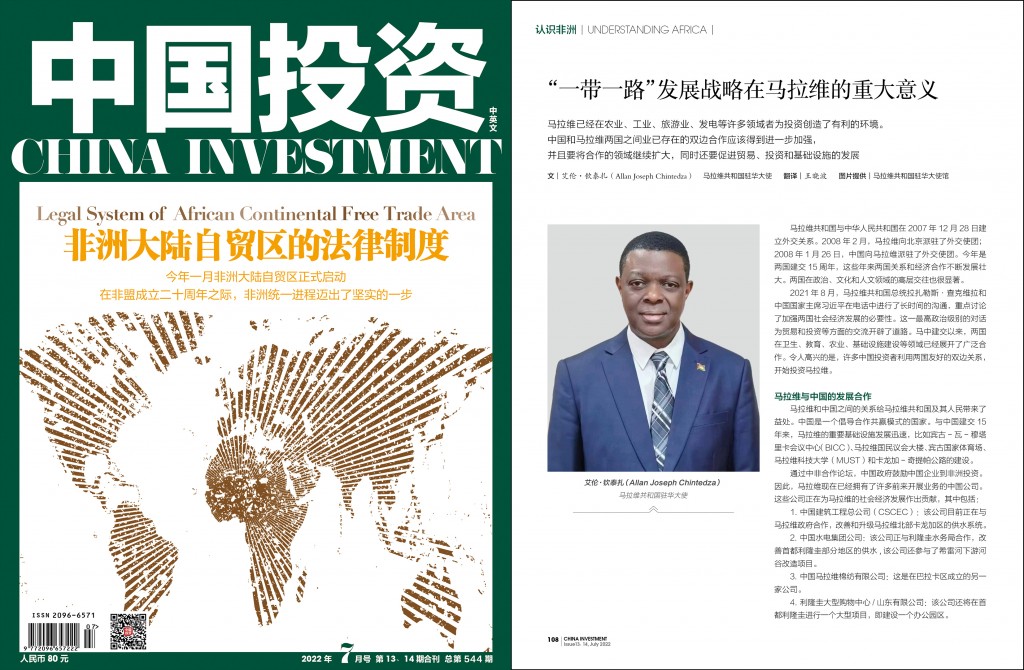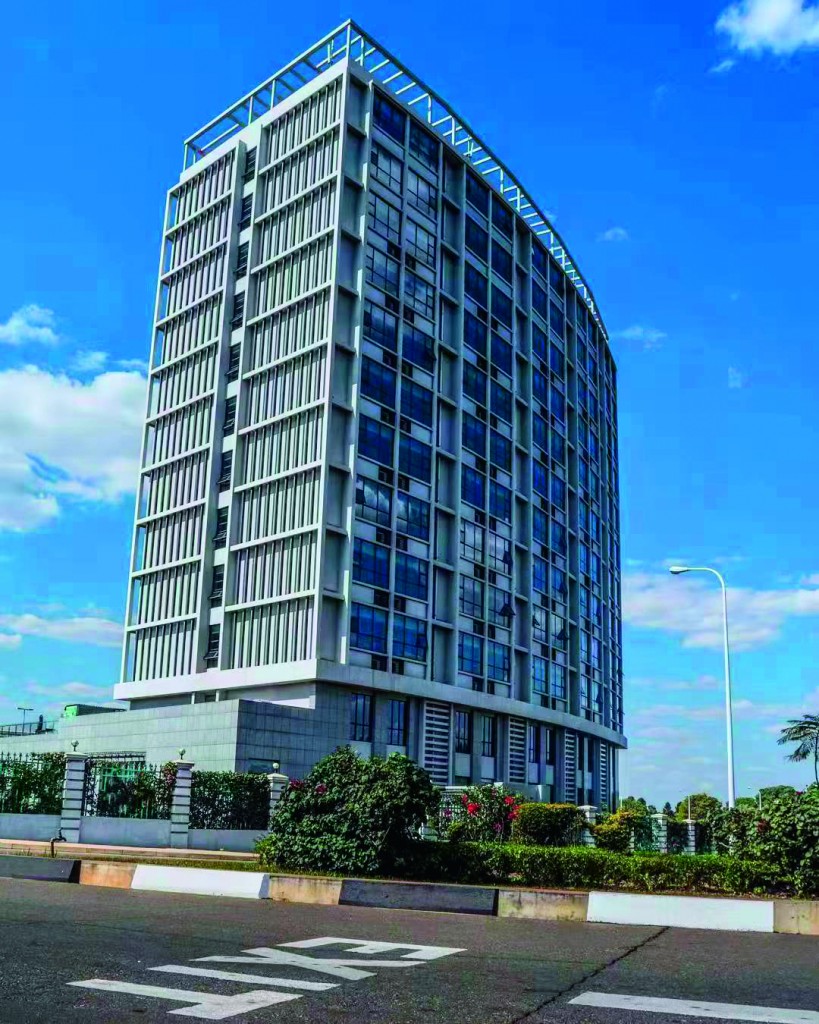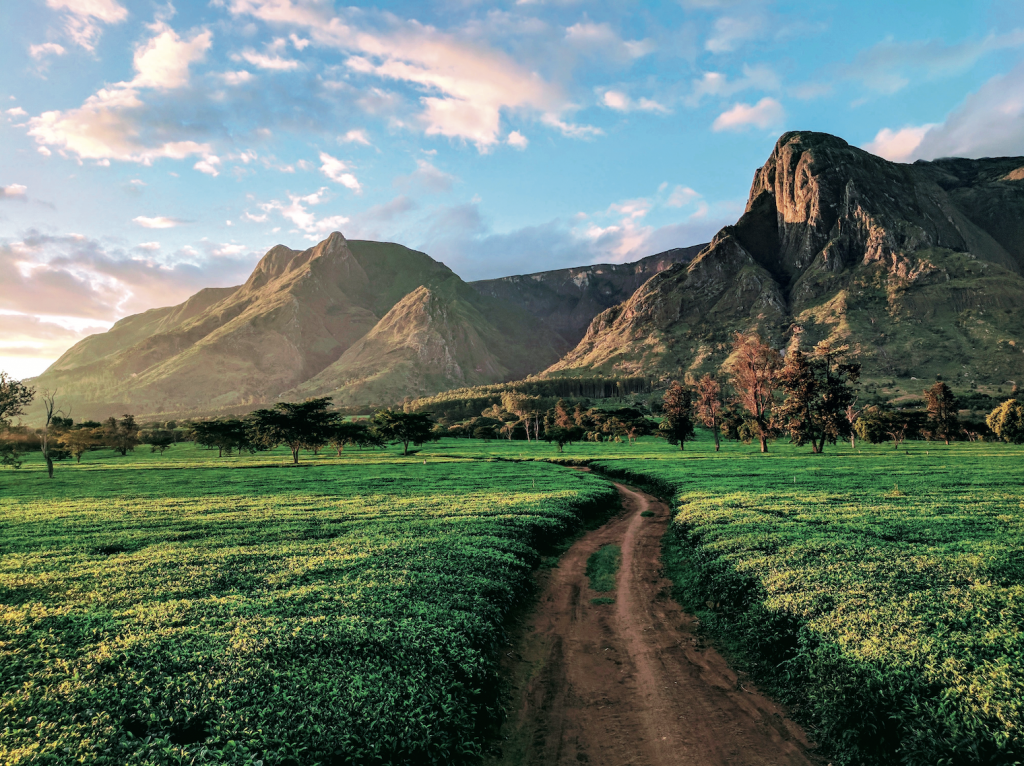The Significant Implications Of The Belt And Road Initiative (BRI) Development Strategy In Malawi“一带一路”发展战略在马拉维的重大意义
By H.E. Allan Joseph Chintedza, Ambassador of the Republic of Malawi to China
文|艾伦·钦泰扎(Allan Joseph Chintedza) 马拉维共和国驻华大使 翻译|王晓波 图片提供|马拉维共和国驻华大使馆
导读
●马拉维与中国的发展合作
●中非合作论坛(FOCAC)
●丝绸之路经济带和21世纪海上丝绸之路倡议(“一带一路”倡议)以及马拉维与中国未来合作的方向
●投资环境
●投资政策
●旅游产业
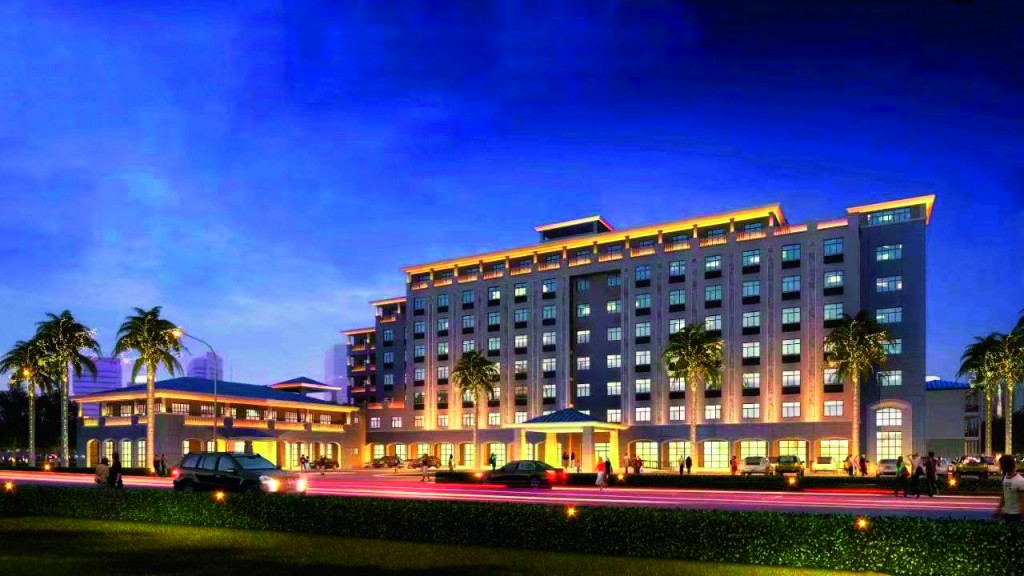
⬆ Golden Peacock Hotel located in Blantyre, Malawi
Introduction
Malawi and China established diplomatic relations on 28th December, 2007, and in February, 2008; Malawi opened its diplomatic Mission in Beijing, while the People’s Republic of China opened its Mission in Malawi on 26th January, 2008. This year marks 15 years since the establishment of the diplomatic relations with the bilateral relationship and economic cooperation between the two countries growing from strength to strength. There has been notable high level political, cultural and people to people exchanges between the two nations.
In August, 2021, His Excellency Dr. Lazarus McCarthy Chakwera, President of the Republic of Malawi and His Excellency Xi Jinping held lengthy discussions on the phone which focussed on the need to strengthen the socioeconomic development between the two countries. This top political level exchange opens the way for other exchanges to take place such as trade and investment. Since the establishment of diplomatic ties between the two countries, China and Malawi have cooperated in various fields such as health, education, agriculture, infrastructure development. It is pleasing to note that a number of Chinese Investors have taken advantage of the cordial bilateral ties between China and Malawi to invest in the Malawi economy.
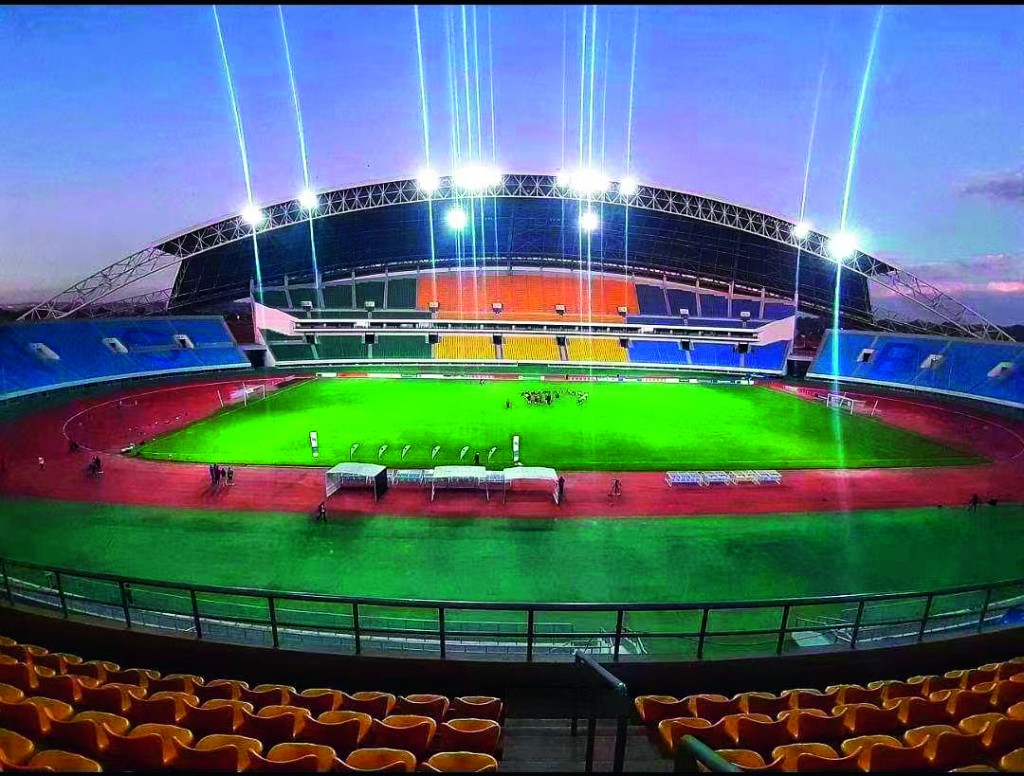
⬆ Bingu Stadium is located in Lilongwe, Malawi
Development Coopeartion Between Malawi And The People’s Republic Of China
The relations between Malawi and the People’s Republic of China are beneficial to the people of the two countries. Both China and Malawi advocate for a win-win model of cooperation. In the 15 years that Malawi has had diplomatic relations with China; the country has witnessed the development of key infrastructures such as the Bingu wa Muntharika Convention Centre (BICC), the Malawi National Assembly Building, the Bingu National Stadium, the Malawi University of Science and Technology (MUST) and the construction of the Karonga-Chitipa Road.
Through the Forum on China-Africa Cooperation(FOCAC), the Government of the People’s Republic of China has encouraged companies and corporations from China to invest in Africa. As a result of this, Malawi is now host to many Chinese companies which are doing business in the country. These companies are making a contribution to the socio-economic development of the country. Some of the companies are: –
a. China State Construction Engineering Company (CSCEC): The Company is currently working with the Malawi Government to improve and upgrade the water supply systems in Karonga District in the northern part of Malawi;
b. Sino-Hydro Corporation: The Company is working with the Lilongwe Water Board to improve water supply in parts of Lilongwe, the capital City. The company is also involved in the Shire Valley Transformation Programme in the lower Shire.
c. The China Malawi Cotton and Textile Company Limited: This is another company established in Balaka and Salima Districts.
d. Lilongwe Grand Mall/ Shandong Limited: The Company is working on a big project to construct an office park in the Capital City, Lilongwe.
e. Anhui Seogecoa Group (Golden Peacock Hotels and Casino): The Group has established a chain of modern hotels in the two major cities of Lilongwe and Blantyre, thereby contributing to the tourism industry in Malawi.
f. Huawei Group: Huawei is working with the Government of the Republic of Malawi on the National Fibre Backbone project to increase ICT connectivity and penetration in the rural areas of Malawi.
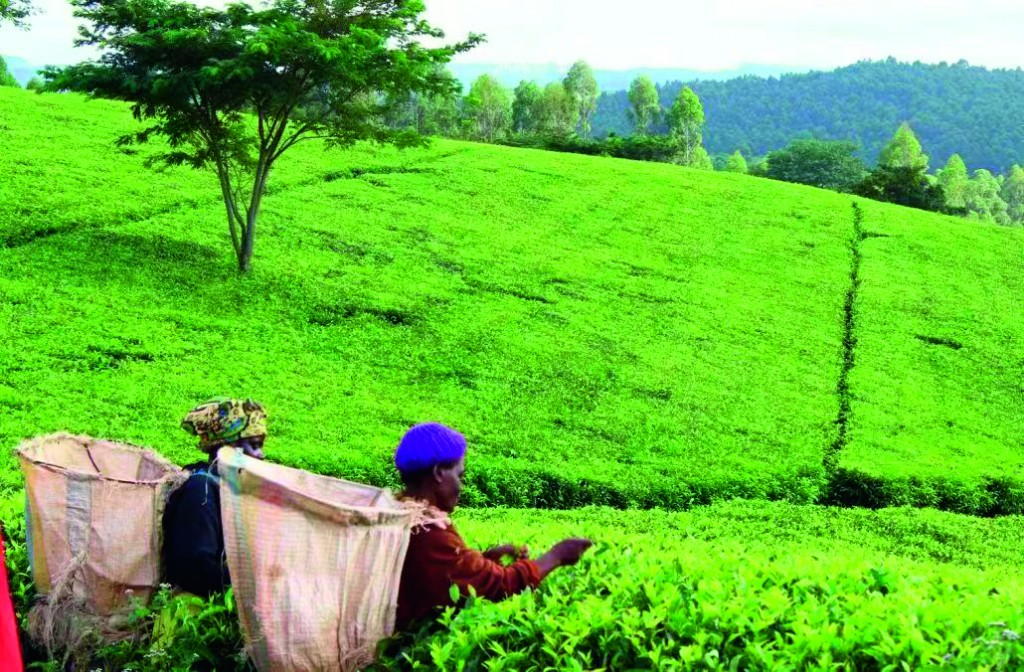
⬆ Mulanje Mountain – Proudly “ the island in the sky”, it is the highest peak inSouthern Africa with the height of 3000m
The Forum On China-Africa Cooperation (FOCAC)
Malawi looks forward to cooperate more with the Government of the People’s Republic of China through the implementation of the Forum on China-Africa Cooperation (FOCAC).
During the 8th Ministerial Conference of the FOCAC held in Dakar, Senegal, from 29th to 30th November, 2021, under the theme: “Deepening the Sino-African Partnership and Promoting Sustainable Development to Build a China-Africa Community with a Shared Future in the New Era”, President Xi Jinping announced at the opening ceremony that China and Africa had jointly prepared the China-Africa Cooperation Vision 2035, which is aimed at determining the direction and objectives of the mid to long term cooperation and promote a closer community with shared future for China and Africa.
He further announced nine new programmes for the next three years, in the context of the 2035 Vision on China-Africa Cooperation, namely: (i) medical and health programmes (one billion doses {600m vaccines donation and 400m vaccines through joint production}); (ii) poverty reduction and agricultural development programme; (iii) trade promotion programme (USD10billion trade finance); (iv) investment promotion programme (USD10billion Chinese investment, debt relief for African LDCs with Chinese interest-free loans due 2021, and USD10billion for Africa under China’s IMF Special Drawing Rights); (v) digital innovation programme; (vi) green development programme; (vii) capacity building programme (10 schools construction and training workshops for 10,000 African professionals); (viii) cultural and people-to-people exchange programme; and (ix) peace and security programme (10 peace and security projects in Africa).
The pleasant feature of the vision is that it takes into account the Africa Union Agenda 2063 as well as individual national development strategies of African countries. In this regard China will work to support the development of African countries by supporting their home grown policies.
It is expected that at the expiry of the vision in 2035, trade between China and Africa will have reached US$300 billion. China will support African countries to increase their export capacities, strengthen cooperation in the inspection and quarantine of agricultural produce and food, as well as accelerate the quarantine process. This is good news for Malawi which is an agricultural country and most of its crops are produced organically. Malawi has just signed a Memorandum of Understanding (MoU) with the Government of the People’s Republic of China through the General Administration of Customs (GACC) on meeting of Phytosanitory requirements so that Malawi can export Soy beans to the Chinese market. Malawi is looking forward to the speedy implementation and execution of this MoU so that the country can begin its export of soybeans and ground nuts to China. Malawi expects that China will open up its market for more products from Malawi and other African countries.
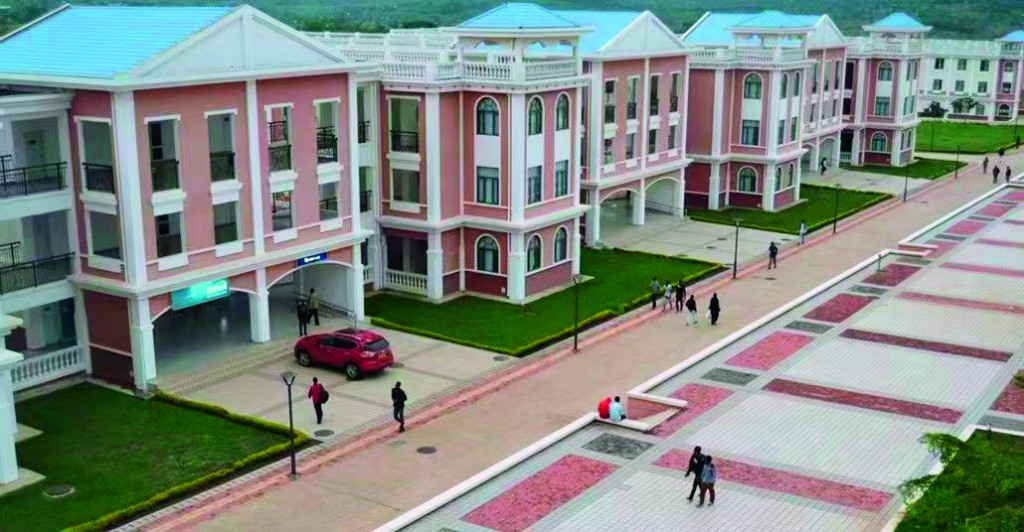
⬆ Malawi University of Science and Technology (MUST), located in Thyolo District, Malawi
The Silk Road Economic Belt And The 21St Century Maritime Silk Road Initiative (Belt And Road Initiative) And The Future Direction Of The Cooperation Between Malawi And China
Malawi signed the Memorandum of Understanding with the Government of the People’s Republic of China on the Cooperation in the Framework of the Silk Road Economic Belt and the 21st Century Maritime Silk Road known in short as the Belt and Road Initiative (BRI) on 5th August, 2021. Malawi views the Belt and Road Initiative as the epitome of Chinese Diplomacy and the centre piece of President Xi Jinping’s Foreign Policy. By this policy, China is helping to promote economic development and inter-regional connectivity through investment in ports, railways, roads, bridges, airports, dams, electricity power stations.
Malawi‘s joining of the BRI is complementary to the Malawi Vision 2063, which is the current policy for national development in Malawi. This is the national blueprint which will guide Malawi’s development plans. With this vision the Government of the Republic of Malawi aims at creating an inclusively wealthy and self–reliant industrialised upper-middle-income country by the year 2063. When launching the vision, the President of Malawi, His Excellency Lazarus McCarthy Chakwera urged Malawi’s development partners and non state actors to join him in designing and implementing only those initiatives that catalyse and sustain the country’s inclusive wealth creation and self-reliance. The Vision is anchored on three main pillars of Agriculture productivity and Commercialisation; Industrialisation and Urbanisation.Through the Agriculture Productivity and Commercialisation pillar, the agricultural industry will produce and supply raw materials for industrial processing and ensure the availability of healthy and nutritious food. The growth of agro-based industries associated with job creation will economically anchor the creation of urban centers. The urban centers that include tourist-based cities will act as off-takers of agricultural produce. This connectivity in agriculture shall ensure an increase in the number of youths engaged in competitive agricultural value chains.
To commercialize the agricultural sector, the Government will embark on a progressive and extensive agricultural programme to boost incomes and spur economic growth. This will go beyond focusing on crops that guarantee food security, so that emphasis is placed on strategic crops, livestock and fisheries that will yield high-income in the local, regional and international markets. The commercialization of the agricultural sector shall particularly target the youth with the intent of encouraging rural economic growth towards greater urbanization. This means moving away from subsistence farming on small plots of lands to mega farms that produce for export. This will involve mechanisation of the agriculture sector, moving away from using the hoe.
The other pillar of the Vision is industrialisation. Through this pillar Malawi aspires to have a vibrant knowledge-based economy with a strong manufacturing industry driven by productive and commercially vibrant agriculture and mining sectors. Industrialization will transform Malawi’s economy from being predominantly consuming and importing to predominantly producing and exporting. The manufacturing sector will have strong backward and forward linkages with the agriculture, mining and services sector. Mining, will help create secondary industries that will enhance import substitution and export growth. Mining has tremendous potential to develop and support the inclusive wealth creation agenda. Value addition will increase the returns from mineral resources while creating more jobs for Malawians, including the skilled and unemployed youth.
The third pillar is Urbanisation, through this pillar the Malawi government aims to establish world-class urban centers and tourism hubs across the country, with requisite modern socio-economic amenities. Well planned urban centers will help promote efficient use of resources that create more sustainable land use and protect the biodiversity of natural ecosystems. This will create opportunities that focus on absorbing the increasing unemployed population from rural-urban migration. Implementation of this pillar will help to turn Malawi into a regional and international tourist destination, harnessing the SADC and Sub-Saharan continental tourist market as well as the rest of the world. Urbanization will, therefore, contribute to the realization of the aspiration of inclusive wealth creation and self-reliance.
Investment Climate In Malawi
Malawi is a landlocked country located in south-eastern Africa. It is bordered by Mozambique, Tanzania and Zambia. Why invest in Malawi? Malawi is a politically stable country with friendly and warm hearted people. It is one of the most peaceful countries in Africa providing a good environment for business growth. Malawi is strategically located and is an ideal investment location, with its beautiful fresh water lake and its scenic mountains and rivers, making it attractive for both leisure and business.
It has a competitive labour market made up of skilled and semi-skilled man-power; Duty-free access to two large regional markets: Common Market for Eastern and Southern Africa(COMESA) and the Southern Africa Development Community(SADC); Duty-free and quota-free access to the European Union(EU)market under Everything But Arms (EBA) facility; and privileged to trade benefits from the USA under the African Growth and Opportunity Act(AGOA) and other signed trade multilateral agreements with the World Trade Organization (WTO) and the Cotonou agreement between the EU and the African, Caribbean, and Pacific Group of States; and bilateral duty-free trade agreements with Mozambique, South Africa, Zimbabwe, China, and Portugal. The Malawi government also signed a customs agreement with Botswana and provides investors with attractive tax incentives as indicated under the official website at the following domain: www.malawi-invest.net.
Through the MITC, Malawi has established a One Stop Service Centre (OSSC) to ease company registration, and provide guidelines on how to qualify for investment incentives, facilitation and processing of land etc. Overall, Malawi has huge untapped economic investment opportunities in Agriculture, Energy, Mining, Manufacturing, Infrastructure Development/ICT, Tourism and Finance. The Malawi government is urging Chinese investors to take advantage of these huge investment opportunities.
Investment Policies Of The Government Of The Republic Of Malawi
Recognising that industrialisation and structural transformation of the economy are essential to maintain the rapid long-term economic growth needed to raise the per capita income, create sufficient rural and urban jobs, widen the tax base to finance Malawi’s welfare requirements and address an unsustainable trade deficit, the Malawi Government has developed the National Industrial Policy, which provides direction on how its productive economy can be developed and industrialised. In addition, through implementation of this policy, the Malawi Government hopes increase the diversification of industrial products; improve value addition to primary products; reduce the trade deficit by promoting exports and import substitution. The Malawi Government is inviting Chinese investors to partner it in the establishment of industrial parks that will increase production for the export market and commercialise the agricultural sector as stipulated in the MW 2063 Vision. Investment in agricultural mechanisation equipment would be ideal for investors from China.
Trade has fundamentally shaped the economy of Malawi. The country’s exports are largely based on primary and semi processed products, solely geared for sale on the global market. Malawi also relies heavily on imported goods, in particular fuel, fertilisers, and most of the manufactured goods. One of the biggest challenges Malawi is facing is the unsustainable trade deficit due to the above narrow export base and weak domestic and international trade linkages and systems. The National Trade Policy is a response to make Malawi a globally competitive export-oriented economy, generating higher and sustainable livelihoods through trade that recognises the role of Micro, Small and Medium Enterprises. This is an area where the People’s Republic of China through the China International Development Agency for Cooperation can assist with soft-ware micro-financing mechanisms for small and medium scale enterprises that would have a direct bearing on the standard of living of the majority of Malawians.
The Tourism Industry
Malawi is a very beautiful country with a gentle rolling landscape with picturesque mountains and plains rich with flora and fauna. The serene and calm Lake Malawi also known as the Lake of stars is home to over 600 species of fish and offers a very rare exquisite tourist attraction. In order to harness the tourism potential, the Malawi Government launched the National Tourism Investment Master Plan in April, of this year (2022). The plan is for a period of 20 years from 2022 to 2042 and aims at providing direction to, among other things, infrastructure development, community participation, and preservation of nature and the environment. The government will create an enabling environment for the private sector to enable it to contribute to the growth of the sector and create jobs for the youth.
Malawi Government is encouraging more and more Chinese investors to emulate the example of those who have already taken advantage of this huge potential in the tourism sector by investing in infrastructure such as the Golden Peacock hotels in two major cities of Lilongwe and Blantyre.
Conclusion
Malawi has created a conducive environment for investment in many portfolios such as agriculture, industries, tourism, power generation and many more. This is supported by the friendly investment policies that the Government of the Republic of Malawi has put in place. The bilateral cooperation that exists between the two countries of China and Malawi, should be further strengthened to translate into areas of mutual cooperation and increased trade, investment and infrastructure development. The signing of the Belt and road initiative memorandum between the Malawi government and the Peoples Republic of China opens the door for Chinese investors to take advantage of the many investment opportunities existing in Malawi, especially through the current 9 programmes stipulated under the 8th ministerial conference of FOCAC. Already, advanced discussions are underway between the Embassy of the Republic of Malawi and the Provincial government of Hunan to take advantage of these investment opportunities by establishing a potential cooperation platform to compliment the already existing China-Africa Economic and Trade Expos (CAETE).
马拉维共和国与中华人民共和国在2007年12月28日建立外交关系。2008年2月,马拉维向北京派驻了外交使团;2008年1月26日,中国向马拉维派驻了外交使团。今年是两国建交15周年,这些年来两国关系和经济合作不断发展壮大。两国在政治、文化和人文领域的高层交往也很显著。
2021年8月,马拉维共和国总统拉扎勒斯·查克维拉和中国国家主席习近平在电话中进行了长时间的沟通,重点讨论了加强两国社会经济发展的必要性。这一最高政治级别的对话为贸易和投资等方面的交流开辟了道路。马中建交以来,两国在卫生、教育、农业、基础设施建设等领域已经展开了广泛合作。令人高兴的是,许多中国投资者利用两国友好的双边关系,开始投资马拉维。
马拉维与中国的发展合作
马拉维和中国之间的关系给马拉维共和国及其人民带来了益处。中国是一个倡导合作共赢模式的国家。与中国建交15年来,马拉维的重要基础设施发展迅速,比如宾古-瓦-穆塔里卡会议中心(BICC)、马拉维国民议会大楼、宾古国家体育场、马拉维科技大学(MUST)和卡龙加-奇提帕公路的建设。
通过中非合作论坛,中国政府鼓励中国企业到非洲投资。因此,马拉维现在已经拥有了许多前来开展业务的中国公司。这些公司正在为马拉维的社会经济发展作出贡献,其中包括:
1. 中国建筑工程总公司(CSCEC):该公司目前正在与马拉维政府合作,改善和升级马拉维北部卡龙加区的供水系统。
2. 中国水电集团公司:该公司正与利隆圭水务局合作,改善首都利隆圭部分地区的供水,该公司还参与了希雷河下游河谷改造项目。
3. 中国马拉维棉纺有限公司:这是在巴拉卡区成立的另一家公司。
4. 利隆圭大型购物中心/山东有限公司:该公司还将在首都利隆圭进行一个大型项目,即建设一个办公园区。
5. 安徽胜高集团(金孔雀酒店等): 该集团在利隆圭和布兰太尔这两个主要城市建造了一系列现代化酒店,为马拉维的旅游业作出了贡献。
6. 华为集团:华为与马拉维共和国政府合作开发国家光纤骨干线项目,改善了马拉维信息通信技术的连通性。
中非合作论坛(FOCAC)
马拉维期待着通过实施中非合作论坛上提出的九大工程,与中国政府开展更多合作。
2021年 11月29日至30日,中非合作论坛第八届部长级会议在塞内加尔的达喀尔举行,主题是“深化中非伙伴关系,促进可持续发展,构建新时期中非命运共同体”。中国国家主席习近平在开幕仪式上宣布,中国与非洲已经共同制定了2035年中非合作愿景,旨在确定中长期合作的方向和目标,推动中非建立一个更加紧密的命运共同体。
他还宣布,在2035年中非合作愿景的背景下,未来三年要开启九大工程,即:1.医疗卫生工程(10亿剂疫苗,其中6亿捐赠,4亿联合生产);2.减贫和农业发展工程;3.贸易促进工程(100亿美元的贸易融资额度);4.投资驱动工程(中国将向非洲投资100亿美元、免除非洲最不发达国家截至2021年底到期未还的无息贷款债务、从中国在国际货币基金组织的特别提款权中转借给非洲100亿美元);5.数字创新工程;6.绿色发展工程;7.能力建设工程(中国向非洲援建10所学校,并为10 000名非洲专业人员提供培训;8.人文交流工程;9.和平安全工程(中国将为非洲援助实施10个和平安全项目)。
这一愿景令人高兴的地方是,它考虑到了2063年非洲联盟议程以及非洲各个国家不同的发展战略。也就是说,中国将通过支持非洲国家的本土政策来帮助非洲国家的发展。
预计当2035年愿景实现之时,中非贸易额将达到3000亿美元。中国将支持非洲国家提高出口能力,加强与其在农产品和食品检验检疫方面的合作,并加快其检疫进程。这对马拉维来说是一个好消息,因为马拉维是一个农业国,其大多数农作物都是有机生产的。马拉维刚刚通过海关总署与中国政府签署了一份关于满足植物卫生要求的谅解备忘录,这样马拉维就可以向中国市场出口大豆了。马拉维希望中国能为包括马拉维在内的更多非洲国家的产品开放市场。
丝绸之路经济带和21世纪海上丝绸之路倡议(“一带一路”倡议)以及马拉维与中国未来合作的方向
2021年 8月5日马拉维与中华人民共和国政府签署了丝绸之路经济带和21世纪海上丝绸之路(简称“一带一路”倡议)框架内合作的谅解备忘录。马拉维将“一带一路”倡议视为中国外交的典范和习近平主席外交政策的中心。在“一带一路”倡议下,中国正在通过投资马拉维的港口、铁路、公路、桥梁、机场、水坝和电站,帮助促进经济发展和区域间的互联互通。
马拉维加入“一带一路”倡议是对马拉维2063愿景的补充,该愿景是马拉维当前政策的蓝图,指导着马拉维的所有发展计划。根据这一愿景,马拉维共和国政府的目标是到2063年建设成为一个包容性富裕、自力更生的工业化中上收入国家。在发布这一愿景时,马拉维总统拉扎勒斯·查克维拉号召马拉维的发展伙伴们和非国家组织与他一同设计并实施那些能够促进和保持包容性财富创造和自力更生的倡议。该愿景以农业生产力和商业化、工业化和城市化这三大支柱为基础。通过农业生产力和商业化,农业将生产和供应用于工业加工的原材料,并确保健康和营养食品的供应。 与创造就业机会相关的农业产业的增长将在经济上支撑城市中心的创建。 包括旅游城市在内的城市中心将充当农产品的承购者。 农业的这种连通性将确保增加参与竞争性农业价值链的青年人数。
为了实现农业部门的商业化,政府将开展一项渐进式和广泛的农业计划,以增加收入并刺激经济增长。 这将不仅仅是关注保证粮食安全的作物,而是将重点放在将在当地、区域和国际市场上产生高收入的战略作物、畜牧和渔业上。 农业部门的商业化应特别针对青年人,旨在鼓励农村经济增长以实现更大的城市化。 这意味着从小块土地上的自给农业转向为出口生产的大型农场。 这将涉及农业部门的机械化,不再使用锄头。
另一个支柱是工业化。通过这一支柱,马拉维渴望拥有一个充满活力的知识型经济,以及由在生产力和商业上充满活力的农业和采矿业驱动的强大制造业。 工业化将使马拉维的经济从以消费和进口为主转变为以生产和出口为主。 制造业将与农业、采矿业和服务业建立强大的后向和前向联系。 矿业,将有助于创建增强进口替代和出口增长的第二产业。 采矿业具有发展和支持包容性财富创造的巨大潜力。 附加值将增加矿产资源的回报,同时为马拉维人创造更多就业机会,包括有技能的失业青年。
第三个支柱是城市化,马拉维政府旨在通过这个支柱在全国建立世界级的城市中心和旅游中心,并配备必要的现代社会经济设施。 精心规划的城市中心将有助于促进资源的有效利用,从而创造更可持续的土地利用并保护自然生态系统的生物多样性。 这将创造机会,专注于吸收因农村向城市迁移而不断增加的失业人口。 这一支柱的实施将有助于利用南部非洲发展共同体和撒哈拉以南大陆以及世界其他地区的旅游市场将马拉维变成一个区域和国际旅游目的地。 因此,城市化将有助于实现包容性财富创造和自力更生的愿望。
投资环境
马拉维是一个位于非洲东南部的内陆国家。它与莫桑比克、坦桑尼亚和赞比亚接壤。为什么要在马拉维投资呢?马拉维是一个政治稳定的国家,人民热情友好。它是非洲最和平的国家之一,为商业发展提供了良好的环境。马拉维处在战略要地,是一个非常理想的投资目地国。其美丽的淡水湖和优美的风景,对休闲和商业都具有吸引力。
马拉维拥有丰富的自然资源,如矿产、河流和湖泊等。它还有极具竞争力的劳动力市场,即熟练和半熟练的劳动力。从马拉维可以免税进入两大区域市场,即东南非共同市场(COMESA)和南部非洲发展共同体(SADC)。它也可以在除武器外的一切商品(EBA)的准则下免税和免配额进入欧盟(EU)。根据非洲增长和机会法案(AGOA),马拉维可以享受美国提供的特殊贸易利益。马拉维与世界贸易组织(WTO)签署了贸易多边协议。欧盟与非洲、加勒比海和太平洋国家集团之间也签有非洲增长与机会法和科托努协定(马拉维也在其中)。马拉维还与东南非共同市场和南共体签署了区域贸易协定,并与莫桑比克、南非、津巴布韦、中国和葡萄牙签署了双边贸易协定,因此与这些国家进出口的商品可以享受免税。马拉维政府也与博茨瓦纳签署了一项海关协定。而且,马拉维为投资者提供了非常有吸引力的税收优惠(www.malawi-invest.net)。马拉维投资和贸易中心(MITC)建立了一站式服务中心(OSSC),旨在简化公司注册、获得投资激励、便利化和土地处理等。此外,马拉维还有未开发的经济投资机会,比如在农业、能源、采矿、制造业、基础设施开发、信息和通信技术、旅游和金融领域。在这些领域,马拉维政府都期待中国的投资者能充分利用其友好的投资环境和机遇。
投资政策
马拉维政府认识到,工业化和经济结构转型对于保持经济长期的快速增长至关重要。这是提高人均收入、创造足够的农村和城市就业机会、扩大税基以满足马拉维人民的福利需求和解决不可持续的贸易赤字所必需的。因此它制定了国家产业政策,为马拉维如何发展其生产性经济和工业化指明了方向。借助这一政策,马拉维政府旨在提高工业部门的生产力和工业产品的多样化;提升初级产品的附加值,以及通过促进出口和进口替代来减少贸易赤字。在这方面,马拉维政府期望中国协助建立能够生产出口产品的工业。马拉维2063年愿景要求农业部门实现商业化,因此对于中国投资者来说投资农业机械化设备也是理想的选择。
贸易从根本上影响了马拉维的经济。马拉维的出口产品都是初级或半加工产品,它们只是为了销售给全球市场而开发的。马拉维严重依赖进口商品,特别是燃料、化肥和大多数制成品。马拉维面临的一大挑战是不可持续的贸易赤字,这主要是由于其生产基础极其有限,国内和国际贸易的体系及联系薄弱。马拉维的国家贸易政策旨在使马拉维成为具有全球竞争力的出口导向型经济体,通过承认微型、中小型企业作用的贸易创造更高水平和可持续的生计。 在这个领域,中国可以通过中国国际合作开发署协助为中小型企业提供软件小额融资机制,这将直接影响到大多数马拉维人的生活水平。
旅游产业
马拉维是一个非常美丽的国家,拥有绵延起伏的风景,拥有美丽如画的山脉和富含动植物的平原。 宁静祥和的马拉维湖也被称为星星之湖,是 600 多种鱼类的家园,是一个非常罕见的精美旅游胜地。 为了利用旅游潜力,马拉维政府于今年(2022 年)4 月启动了国家旅游投资总体规划。 该计划为期 20 年,从 2022 年到 2042 年,旨在为基础设施发展、社区参与以及保护自然和环境等方面提供指导。 政府将为私营部门创造有利环境,使其能够促进该部门的发展并为青年创造就业机会。
马拉维政府正在鼓励越来越多的中国投资者效仿那些已经利用旅游业的巨大潜力,在利隆圭和布兰太尔两个主要城市投资基础设施的企业,如金孔雀酒店。
结语
马拉维已经在农业、工业、旅游业、发电等许多领域为投资者创造了有利的环境,并且得到马拉维共和国政府制定的友好投资政策的支持。中国和马拉维两国之间业已存在的双边合作应该得到进一步加强,并且要将合作的领域继续扩大,同时还要促进贸易、投资和基础设施的发展。马拉维共和国和中华人民共和国签署的“一带一路”倡议备忘录为中国投资者利用马拉维现有的许多投资机会打开了大门,特别是通过中非合作论坛第八届部长级会议上确定的当下正在实施的九大工程。马拉维共和国驻华大使馆已经在与湖南省政府进行高级别的讨论,旨在建立一个潜在的合作平台,作为现有的中非经贸博览会(CAETE)的补充,最终的目的仍是充分利用马拉维的这些投资机遇。


